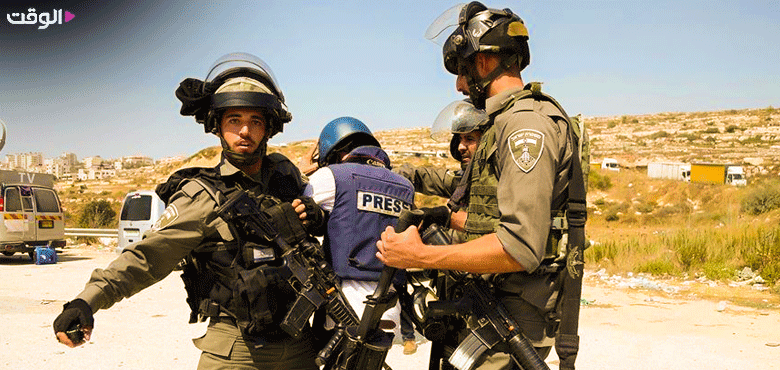Alwaght- According to the Palestinian Committee to Protect the Journalists (PCPJ), Israeli forces arrested 9 Palestinian journalists just in October.
15 other Palestinian journalists were reportedly wounded by Israeli forces during the operation. According to the latest report of the Palestinian Prisoners of War Club, the number of Palestinian prisoners in Israeli jails has reached 4,600, including 200 children and 35 women, and 500 are in “administrative detention.”
Earlier, PCPJ said in a report that Israeli government had violated the rights of Palestinian media workers 652 times since the beginning of the year. The report also states that the Israeli military has attacked journalists several times during this period. During the 11-day war on Gaza in May a journalist was killed and 59 media centers were damaged by Israeli airstrikes.
The committee has called on the international community to protect the Palestinian journalists who are always targets to Israelis attacks. It also called for pressures on Tel Aviv to release 24 captured journalists.
In an annual report in January, the Palestinian Journalists Syndicate (PJS) asserted that Israel violated rights of Palestinian journalists 490 times in 2020.
Systemic violation of international laws
The Israeli government continues to detain Palestinian journalists in violation of the international laws. The torture and detention of journalists is in complete violation not only of Israeli domestic law but also of the international law. Reporters Without Borders (RWB) also warned last month that journalists and families of prisoners in Palestine were at risk of arbitrary detention after totally unfair convictions.
Elsewhere in the world, in Turkey for example, Western reactions are made to violations of rights of the journalists. Last year, the European Court for Human Rights reacted to detention of journalists by Turkish government, stating that temporary and long-term sentences for journalists in Turkey are merely based on “suspicious cases” and there are no persuasive pieces of evidence to deprive the journalists of their right of freedom before judicial proceedings.
The cases of violation of the rights of the journalists in the occupied Palestinian territories have been way more compared to Turkey but the Western institutions choose to turn a blind eye.
It was in the shadow of this Western blindness that Tel Aviv razed to ground Al-Jalaa media tower in Gaza city with bunker buster bombs that penetrated the foundation of the tower, which hosted Associated Press and Aljazeera offices. The pictures of the bombardment were aired by world media live. The “shocking and terrifying” attacks, an apparent war crime, remained practically unaddressed by the international community and Western governments.
Israeli officials have repeatedly proven that they do not shy away from violating international laws in the light of the West's silence and support. Last week, the Israeli envoy to the UN tore up a Human Rights Watch report condemning Tel Aviv. The Israeli regime has been violating the UN resolutions for many years, and settlements in the West Bank are the most obvious form of violation of the international laws.
Seeking to cover up crimes
Tel Aviv knows that the more it cracks down on the journalists, the more it can throttle the stream of information about the Palestinian circumstances. Therefore, the regular attacks on the journalists are coming with the aim of preventing world awareness of the realities in the occupied territories.
The Israeli military routinely attacks, beats, arrests, seizes equipment of journalists covering protests against settlement projects, raising the cost of reporting on the situation in Palestine so that limited journalists can cover. With risks of long-term detentions and inhumane conducts by Israeli forces, journalists usually have much difficulty and restrictions reporting from Palestine.
Also, there is a systemic censorship policy followed by the Israeli officials. The Israeli regime, despite claims of being democratic, has in place laws of martial supervision of the news and media productions and therefore applies a strict regime of censorship. The Israeli Military Censor (IMC) is a unit of the Israeli army which watches over the publication of information regarding the military network and the general security. The IMC has “Censorship Agreement” signed in 1966 with representatives of media outlets. The Israeli media are ruled by a 1945 emergency law imposed when Palestine was under the British mandate. This censorship includes content published on television and radio networks and in newspapers and even books, and before it is published, it should be examined by the relevant center, and what is dangerous from the point of view of military censorship should be removed from the content. Naturally, content related to Palestine and against the Israelis favor is easily deleted and censored. Tel Aviv is in complete control over the cyberspace and communication networks of the Palestinian territories.
Cover-up of the Israeli crimes in Palestine takes place both through detaining and silencing the journalists and also officially by the government agencies on Tel Aviv-controlled cyberspace and communication networks. These actions explain why Israeli crimes less frequently find their way to the international media.



























